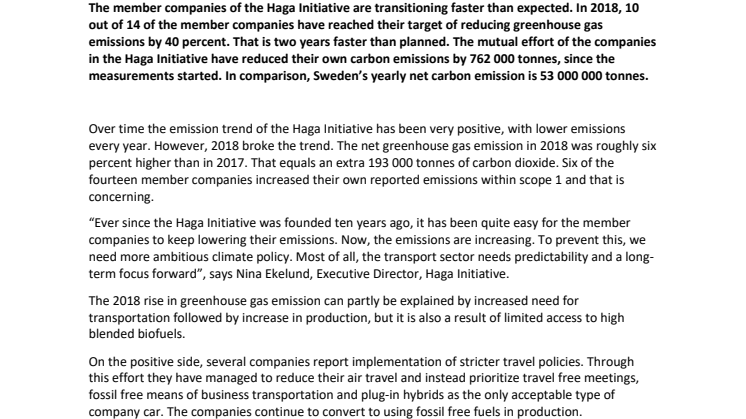Pressmeddelande -
Emissions increase in 2018, even though more companies reach climate target
The member companies of the Haga Initiative are transitioning faster than expected. In 2018, 10 out of 14 of the member companies have reached their target of reducing greenhouse gas emissions by 40 percent. That is two years faster than planned. The mutual effort of the companies in the Haga Initiative have reduced their own carbon emissions by 762 000 tonnes, since the measurements started. In comparison, Sweden’s yearly net carbon emission is 53 000 000 tonnes.
Over time the emission trend of the Haga Initiative has been very positive, with lower emissions every year. However, 2018 broke the trend. The net greenhouse gas emission in 2018 was roughly six percent higher than in 2017. That equals an extra 193 000 tonnes of carbon dioxide. Six of the fourteen member companies increased their own reported emissions within scope 1 and that is concerning.
“Ever since the Haga Initiative was founded ten years ago, it has been quite easy for the member companies to keep lowering their emissions. Now, the emissions are increasing. To prevent this, we need more ambitious climate policy. Most of all, the transport sector needs predictability and a long-term focus forward”, says Nina Ekelund, Executive Director, Haga Initiative.
The 2018 rise in greenhouse gas emission can partly be explained by increased need for transportation followed by increase in production, but it is also a result of limited access to high blended biofuels.
On the positive side, several companies report implementation of stricter travel policies. Through this effort they have managed to reduce their air travel and instead prioritize travel free meetings, fossil free means of business transportation and plug-in hybrids as the only acceptable type of company car. The companies continue to convert to using fossil free fuels in production.
“Since 2009, we have reduced carbon emissions by about 80 percent in our Swedish production facilities. This as a result of our strong focus on increasing energy efficiency and reducing our use of fossil fuels. In Sweden we have high hopes of reaching a fossil free production in terms of energy very soon. These efforts are important to show leadership in sustainability and ensure that we are prepared for the future. For us it has always been important that the investments we make also contribute to our profitability and to strengthening Lantmännen as a company”, says Per Olof Nyman, CEO and Group President of Lantmännen.
The 2030 target of the Haga Initiative will require a transition faster than stated by Carbon Law. According to Carbon Law a 50 percent reduction of greenhouse gas emissions is needed every decade, for the world to stand a chance at limiting global warming to a 1.5-degree increase, and net zero carbon dioxide emissions by 2050. The Haga Initiative aim for net zero emissions by 2030.
“Since 2005 we reduced our emissions by 28 percent. We are increasing the amount of bio propane in our coffee roasting facilities and we change from fossil-based plastics to plant-based alternative in our packaging. This leads to reduced climate impact and higher customer satisfaction”, says Lars Appelqvist, CEO, Löfbergs.
The Greenhouse gas emissions disclosure of 2018 also display a clear decoupling effect. As the emissions kept decreasing over the years, the business profit kept increasing.
GHG Emission Disclosure – read here
Press contact:
Nina Ekelund, Executive Director, Haga Initiative
+46-735-022 464nina.ekelund@hagainitiativet.se
Relaterade länkar
Ämnen
- Företagande
Kategorier
- emission reduction
- carbon emissions
- the haga initiative
- climate target
- greenhouse gas emissions
- vd-engagemang
- lönsamhet
- klimatarbete
- klimatpolitik
The Haga Initiative is a business network that strives to reduce the industry’s carbon footprint. The network includes: Axfood, Coca-Cola European Partner Sverige, Folksam, HKScan Sweden, JM, Lantmännen, Löfbergs, McDonald's, Nouryon, Preem, Siemens, Stena Recycling, Stockholm Exergi and Sveaskog.

